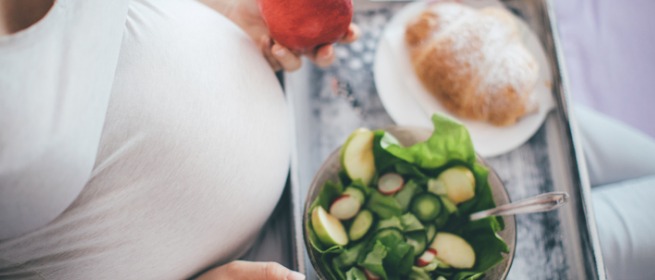
Which foods are safe to eat while pregnant and which ones aren’t is a contentious issue. Some pregnant women won’t touch some foods while others eat them regularly throughout multiple pregnancies without any problems.
As our awareness of hazardous foods improves over the years, the list of forbidden foods while pregnant seems to grow. Not only are we more educated about the risk of food poisoning now than what our mums were in the 1970s and 1980s but they also didn’t have the variety of foods to choose from that we do today.
The Main Food Related Risks While Pregnant
The biggest food-related risks for pregnant women are bacteria, parasites and heavy metals
Listeria
Listeria is a bacteria in food which causes listeriosis. People in the community at highest risk of listeria are those with a compromised immune system, pregnant women and their unborn babies. Listeria can lead to stillbirth, miscarriage and other pregnancy complications if a pregnant mother eats food containing the listeria bacteria.
Parasites
While infection by parasites is not as common in Australia as most countries around the world, there are still some common ones that pregnant women should be aware of. When a pregnant woman is infected with hookworm, tapeworm or malaria, they are at risk of becoming anaemic which can cause them to deliver a baby with low birth weight. Usual treatment methods for non-pregnant patients may not be suitable while pregnant.
Toxoplasma gondii is a parasite found in uncooked meat, cat faeces, soil and untreated water. Pregnant women should be wary of eating meat that isn’t thoroughly cooked. They should also leave cleaning out the cat’s litter tray while pregnant and wear gloves in the garden.
Giardia intestinalis is another common parasite, and pregnant women with older children in childcare are at risk of catching it from them. Washing hands carefully after changing a nappy, ingesting pool water and digging in the garden can help to avoid infection as the parasite can live outside the body for an extended period of time.
Mercury
The nervous system of unborn babies is most at risk of mercury during the third and fourth months of gestation resulting in potentially slow development in the early years.
There is no need to avoid fish altogether while pregnant. In fact, the omega-3 fatty acids in fish make it an ideal food for pregnant women. Research has shown the fatty acids in fish promote foetal brain and eye development. Fish is also high in protein, low in saturated fat and high in unsaturated fat.
The main concern with eating fish while pregnant is that you don’t consume too much mercury. Older predatory fish such as shark, barramundi, southern bluefin tuna, ray, gemfish, orange roughy, ling and swordfish can have high quantities of mercury. Food Standards Australia New Zealand recommends pregnant women not consume older fish more than once per fortnight.
Which Foods are Safe and Unsafe to Eat While Pregnant?
We have done the research and put together a list of some of the most commonly asked-about foods for pregnant women:
Is bacon safe to eat while pregnant?
Yes, if cooked thoroughly
Like most meats, bacon contains bacteria. However, it is safe to eat because it’s meat that needs to be cooked before consumption.
Is ham safe to eat during pregnancy?
No, unless cooked
Deli meats that are being added to a sandwich or salad are unsafe for pregnant women. Avoid eating ham, salami, chicken meat purchased cold from the deli section of the supermarket. These products can contain listeria or toxoplasma parasites. It is okay to consume the meats once you have cooked them as the heat will kill the germs.
Is ice cream safe to eat when pregnant?
It depends which type
Ice cream is one of the treat foods pregnant women like to eat. It is safe if it’s purchased from the supermarket. Don’t consume soft serve ice cream from anywhere - ice cream van or restaurant – as all soft serve carries a risk of listeria. Eating homemade ice cream is also a risk if it contains raw or undercooked eggs.
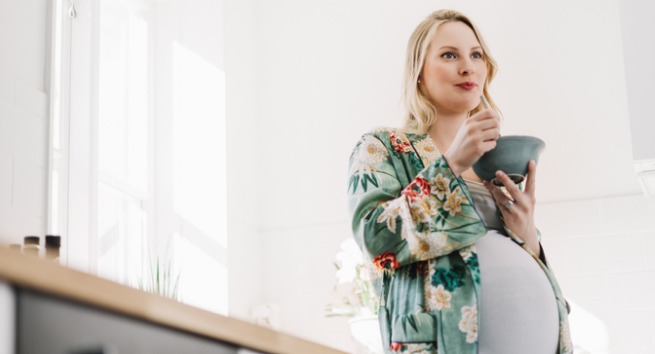
Is it safe to drink coffee if I’m pregnant?
Yes in moderation.
You can continue to enjoy your coffee fix while pregnant just don’t drink too much! Limit your caffeine intake to 200mg a day which is about 2 cups of instant coffee, 1.5 pod coffees and four cups of tea. Energy drinks also contain high quantities of caffeine so check you aren’t going over your daily limit by drinking these as well as coffee in one day.
Can you eat halloumi while pregnant?
Yes
Halloumi is on the list of safe cheeses to eat while pregnant as long as it is made from pasteurised milk.
Can you eat takeaway food while pregnant?
It is safe to eat takeaway food if you are consuming freshly prepared hot food immediately. Discard any uneaten portions and don’t reheat them.
Can I eat leftovers when pregnant?
Yes
It’s a common question if you are used to eating leftover meals you have prepared. Make sure you place sealed leftovers in the fridge as soon as possible then reheat with 24 hours. Food should be piping hot when serving and not reheated again if not all of the leftovers were consumed.
Is sour cream safe to eat during pregnancy?
Yes
Sour cream is made from pasteurised milk, so it’s safe to eat cold or hot stirred through a meal. The only concern is the high-fat content so if you are watching your weight, use sour cream sparingly.
Can you eat calamari while pregnant?
Calamari is safe to eat while pregnant as long as it’s fresh and cooked through. Calamari has low levels of mercury compared to some fish.
Can you eat salad when pregnant?
Some caution is needed.
Salads and salad leaves are safe to eat during pregnancy if they have been freshly prepared and stored cold. Make your own at home rather than buying a pre-prepared salad, so you are confident that the ingredients are washed, and you know what the dressing is made of. If using packaged, salad leaves that have ‘washed and ready to eat’ printed on the packaging should be rewashed before serving. Salads can contain toxoplasma parasites and listeria. Throw out any uneaten salads and follow the use by date on packaged salads.
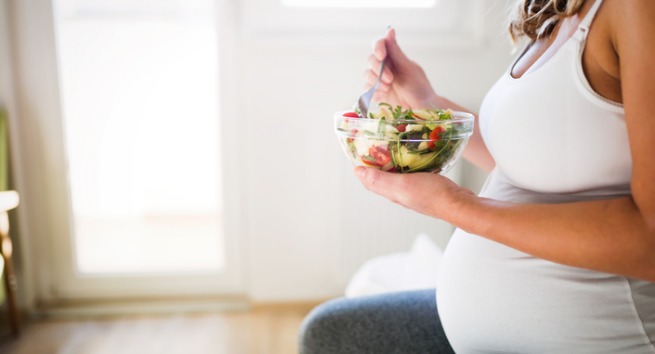
Can I eat sprouts if I’m pregnant?
No
It is not possible to wash sprouts thoroughly enough to make them safe to eat while pregnant. Bean sprouts, snow pea sprouts, mung beans, and sunflower sprouts can be contaminated with salmonella bacteria, a type of food poisoning. Alfalfa sprouts have been found to have e-Coli bacteria. Even homegrown sprouts are risky as the bacteria is dormant in the seed then multiplies as it sprouts.
Should you avoid eating mayonnaise during pregnancy?
Some caution is advised.
If you like a little mayonnaise on your lunch roll, you don’t need to skip it while pregnant, just be mindful of the type you are eating. Shop bought bottles of mayonnaise, and other dressings are safe because they are made from cooked and pasteurised ingredients.
Don’t eat any mayonnaise or dressings that may be homemade or prepared at restaurants as they may contain raw eggs.
Can I eat cheesecake while pregnant?
It depends.
Most cheesecakes – baked and unbaked – use cream cheese as the main ingredient. Cream cheese might seem like a soft cheese, but it’s safe to eat because it’s made from pasteurised milk. Check on the other ingredients in case there are raw or undercooked eggs used or unpasteurised cheese. If you know what's in the cheesecake, then you are safe to indulge in your favourite dessert.
Can you eat ricotta while pregnant?
Yes, if cooked.
Ricotta is a soft, creamy cheese that is safe when cooked. Avoid any desserts or dishes that use raw ricotta as they can carry a risk of listeria.
Can I eat smoked salmon when pregnant?
Yes, but only canned salmon.
Uncanned smoked salmon that is stored cold isn’t recommended because it can carry listeria. Only eat smoked salmon from a freshly opened can.
Should you eat cheese while pregnant?
It depends on the type of cheese.
Cheese is one of the most complicated foods regarding which ones are safe while pregnant and which ones aren’t while pregnant. Hard cheese is perfectly safe to eat including tasty, cheddar, gruyere, cheshire, romano, swiss, edam, gouda and manchego. Smoked hard cheese is also safe. Unsafe cheeses include brie, camembert, chevre, ricotta, bocconcini, danish blue, gorgonzola and feta.
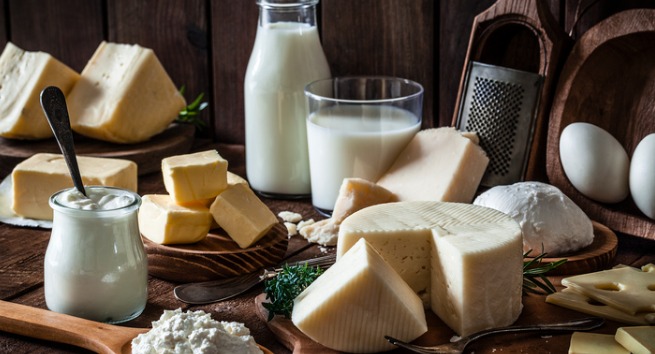
Is tuna safe to eat if you are pregnant?
Yes
Canned light tuna is safe and a good source of protein while pregnant. Wild-caught Australian tuna contains low levels of mercury because it is made from young, smaller fish.
Can you eat fruit and fruit smoothies while pregnant?
Yes but be aware of a few risks.
Whole fruit is a healthy snack while pregnant. Buy your fruit whole and cut it up yourself. Pre-cut fruit can carry listeria so buy your fruit whole. Thoroughly wash the skin before cutting it at home. Rockmelons with their rough skins are the riskiest fruit and have been the cause of a major outbreak of listeria on the east coast of Australia. Make your own fruit salad at home after thoroughly washing the fruit and board rather than buying one ready made. It is also safest to make your own fresh fruit juices and fruit smoothie drinks at home rather than buying one from a bar in case any of the fruit is contaminated.
Can I eat bocconcini during pregnancy?
Only if it’s cooked.
Bocconcini is a semi soft cheese so it can only be eaten after heating to at least 75 degrees and eaten soon after.
Should you eat sushi while pregnant?
No.
Sushi is a high risk food which the FSANZA recommends pregnant women avoid. If raw fish or seafood is used in the rolls, there is a high risk of listeria contamination. Even if you choose sushi without seafood, there is the risk of cross-contamination if your roll was prepared or stored near rolls containing seafood. Listeria can multiply if sushi rolls and sashimi when they are not kept cold and stored on display at room temperature. You can still enjoy sushi by making your own using fresh, ingredients that you have prepared and cooked yourself.
Can you eat any seafood while pregnant?
Yes, but only some types.
Choose seafood and fish with lower mercury levels including prawns, lobsters, oysters, salmon and canned tuna. It is safe to consume to these fish 2-3 times per week. Purchase the fish raw and cook it yourself. Ready to eat fish and seafood is unsafe because it may contain parasites and listeria.
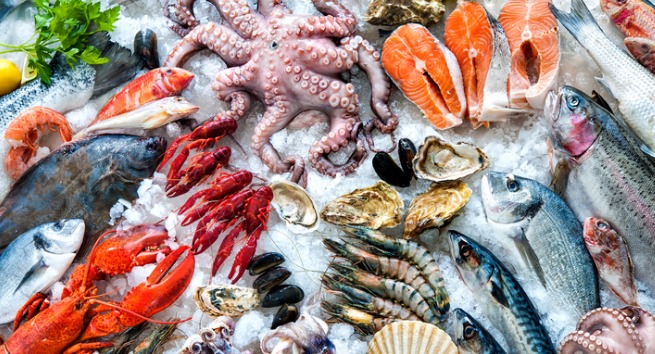
Food Safety While Pregnant - It’s all in the Preparation
While pregnant you are more at risk of food poisoning, so you need to be more aware of safe food preparation practices. Thoroughly wash your hands, kitchen surfaces, cutting boards and knives before you begin. Any fruits and vegetables should be carefully washed before placing them on the preparation surfaces. Separate raw meat and cooked food in the fridge and make sure defrosting meat can’t drip on to other foods.
If you are cooking any ingredients that are unsafe raw, make sure they are cooked through and eaten hot to kill any bacteria.
Risky Supplements
It’s not just food that is a risk to your unborn baby when pregnant. Some vitamins are risky if taken in high doses or combined with a pregnancy multi-vitamin you might be taking.
The main vitamin to avoid while pregnant is vitamin A as it can impact fetal development. It’s just the supplement form that’s risky, there are no vegetables high in vitamin A, so you aren’t at risk of eating too many carrots.
Other vitamins that can build up in the body include vitamins D which you should try to get from the sun and not supplements while pregnant. Vitamin E supplements is a synthetic version which has been linked to heart defects. Taking vitamin E above what’s in a prenatal vitamin increases the chance of giving birth to a baby with a heart defect by 70%. Taking vitamin K is linked to babies being born with jaundice, a yellowing of the skin caused by a buildup of bilirubin.
The most common safe supplements taken during pregnancy include folate, iron, vitamin D, magnesium, ginger, probiotics, and probiotics.
In conclusion
Remember a balanced diet is the best way to get the vitamins and minerals you need for a healthy pregnancy and baby. Always check with your pharmacist or doctor before taking any supplements, over the counter or prescribed medications while you are pregnant.
If you have any queries about food safety while pregnant ask your GP or obstetrician.